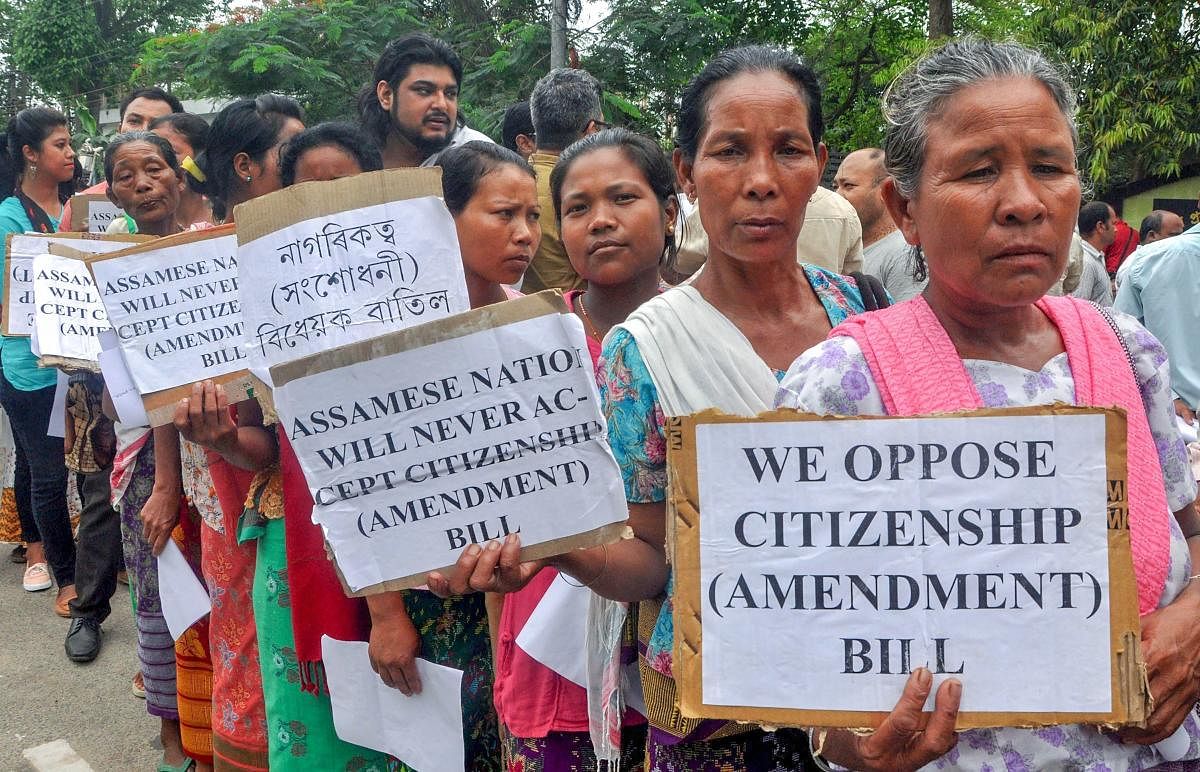
Two years ago, in an article in this paper (‘Only Hindu Refugees Welcome’, August 19, 2016) I had highlighted the politics of terminology being played out with the proposed amendments to the Citizenship Rules of 2009 and the Citizenship (Amendment) Bill of 2016, specifically noting that any move that aims at providing succour to refugees from neighbouring countries but with a religious angle must not be glossed over as it sends out a politically incorrect message to the world that India as a nation welcomes only Hindu refugees.
That message has been conveyed loud and clear as the Joint Parliamentary Committee (JPC) Report on the Citizenship (Amendment) Bill, 2016, was tabled in Parliament and the Lok Sabha passed the Bill, amidst anti-BJP protests in states like Assam. The essential conundrum here being that India, despite being a non-signatory to the 1951 UN Refugee Convention, is still obliged to adhere to the principle of non-refoulement, which forms a crucial part of customary international law and forbids refugees from being returned or expelled to places. But by passing the Citizenship (Amendment) Bill, 2016, India will be welcoming refugees of only one religion, and thus ostensibly turning back all those who are not of that religion.
What is even more unfortunate is that this adds to the climate of intolerance and religious divisiveness that continues to plague the socio-political reality of our times. This Bill, surfing forward on the shoulders on arguments and statements that it is an “atonement for the mistakes of Partition” has simply reignited the religion-based hate speak versus right to free speech debate and even led to politicians and public figures like Himanta Biswa Sarma, Assam’s finance minister, making it into a “fight between Jinnah’s legacy and India’s legacy” (sic).
The JPC, which comprised a majority of NDA members, retained, and the Lok Sabha passed, the provisions that proposed to make minority (or non-Muslim) immigrants from three neighbouring countries, Bangladesh, Afghanistan and Pakistan, eligible for Indian citizenship after six years of residence in India, instead of 12, even if they do not possess any proper documentation.
All this despite steadfast opposition from parties like Congress, Trinamool Congress, CPM and a few others on the grounds that citizenship cannot be given on the basis of religion and that this Bill’s provisions relating to Bangladesh are in contradiction with the Assam Accord. While the latter seeks the repatriation of all persons who reached the state after March 25, 1971, the Citizenship Amendment Bill seeks a different treatment for Hindus from Bangladesh. Members of the JPC from the opposition parties sought a reconsideration on grounds that the Centre has notified a nine-member committee on the implementation of Clause 6 of the Assam Accord that deals with the rights of the ethnic Assamese and seeks “to protect, preserve and promote the cultural, social, linguistic identity and heritage of the Assamese people.”
Even the Asom Gana Parishad, which just walked out of its alliance with the BJP over the issue, has warned the BJP against the Citizenship Amendment Bill. On Tuesday, the All-Assam Students’ Union (AASU), the North East Students’ Union (NESO) and other organisations held a ‘Black Day’ 11-hour strike in Assam and the North-East against the legislation.
In neighbouring Nagaland, the opposition and the Naga People’s Front (NPF) leader T R Zelaing has demanded clarification from the state government, stating that the Bill is a negative determining factor for the survival of the Naga people. Nagaland is protected under Article 371(A) of the Constitution. If the Citizenship Amendment Bill, 2016, is passed by parliament, then it will override Article 371(A). In fact, at a press conference, NPF MLA Imkong Imchen said, “Bangladeshi Christians shall never come to Nagaland, but Bangladeshi Muslims will, provided they accept Hinduism. That is the logic of the amendment.” The simmering anxiety of non-Hindu minority groups is evident.
Fanning hatred
This Bill, if passed by the Rajya Sabha, too, will only perpetuate the argument of the current government that the claim to forced migration belongs only to those minorities
fleeing discrimination and not to ‘economic migrants’ who migrate willingly and hence are ‘illegal’. It will fan the already existing religion-based hate speeches that only divide communities and divert attention away from other pressing citizens’ rights like employment, education and health.
The debate and dissent surrounding the push to pass this Bill further highlights the dangerous dialectic of granting asylum on religious grounds in a nation that officially rests on the ethic of secularism. It perpetuates the dispiriting and dangerous approach of emphasising ‘illegality’ in the context of immigration.
All opposition to it pleads for humanity and a sense of neutrality and fairness to replace the dehumanising and marginalising approach of discriminating between people seeking asylum on the basis of religion and the much-panned approach of calling undocumented people ‘illegal immigrants’ — or worse ‘illegal aliens’. Today, we stand at a juncture from where we can see a political issue being further politicised through the use of divisive terminology and inflammatory rhetoric. If we do not stop and rethink now, history may never forgive us.
(The writer is an alumnus of the Refugee Studies Centre, University of Oxford, UK, and is currently Associate Professor at the Centre for Research in Social Sciences and Education (CERSSE), JAIN (Deemed-to-be) University, Bengaluru)